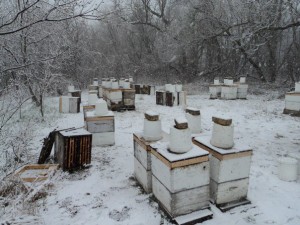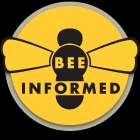
Using beekeepers’ real world experience to solve beekeepers’ real world problems
Be Included, Be Involved, Bee Informed
The Bee Informed Partnership is an extension project that endeavors to decrease the number of managed honey bee colonies that die over the winter.
Since the winter of 2006 – 2007, overwintering colonies in the US have died in large numbers. Affected beekeepers span the entire spectrum of the industry: migratory beekeepers to stationary beekeepers; and commercial beekeepers, part-time beekeepers, to backyard beekeepers. Migratory and stationary beekeepers alike have, on average, lost 30% or more of their overwintering colonies over the last several years. These losses are unsustainable. If they continue, they threaten not only the livelihoods of beekeepers who manage bees, but the livelihood of farmers who require bees to pollinate their crops.
But there is good news! Not all beekeepers are losing 30% or more of their hives each winter. About a quarter of all beekeepers responding to last year’s winter loss surveys lost fewer than 15% of their hives – an acceptable rate. Sadly, however, another 25% of all beekeepers lost over 55% of their colonies. So what’s the difference? Why are some beekeepers losing a few colonies while others are losing so many? That question, in a nut shell, is the main question that the Bee Informed Partnership is trying to answer.
All beekeepers know that keeping bees healthy and productive is a complicated endeavor. There is no “one right way” to keep bees. What works for a backyard beekeeper in Florida may not work for a backyard beekeeper in Minnesota, and a part-time beekeeper that pollinates a couple of acres of apples in Pennsylvania will need to do different things at different times than a beekeeper that makes honey in Oregon. To make things even more complicated, keeping colonies alive is not always about what beekeepers do, but where the bee colonies are located. Colonies foraging on meadows of wildflowers in Ohio may survive differently than colonies foraging on a field of cucumbers 5 miles down the road. Given these many complex factors, how can we hope to figure out what practices and strategies are “best”? Thankfully, there is a whole field of science that has developed tools to help make sense of complicated questions like this – epidemiology.
This project will adapt the tools developed by human epidemiologists to study complex human diseases (such as cancer or heart disease) to study honey bee colony health. However, this project will be slightly different than traditional “community health” initiatives in a couple of important ways:
- Its focus will be to identify management practices that keep colonies alive (rather than just looking for factors that increase the risk of mortality).
- Findings will be shared rapidly, transparently, and in ways that will enable beekeepers to make informed individualized decisions.
At its core, the Bee Informed Partnership is motivated by the conviction that beekeepers, when presented with beekeeper-derived data that objectively shows which management practices worked and which did not, will adopt the more successful practices. This, in turn, will reduce colony losses.
How do we propose to do this? In essence, by asking beekeepers what they do and how their colonies respond. To start, in 2011, we will not only continue to conduct our winter-loss surveys, we will also initiate a survey asking detailed management questions. We will then summarize these findings and present them in unbiased ways as soon as we are able. In future years we will automate this process and develop tools that will enable beekeepers to interact with the results so they can compare their own practices and successes with others in their region or operational size. We will also expand and develop other levels of the survey so we can assess and present the economic costs of treatment strategies in real time over the course of a year. By compiling a comprehensive honey bee disease data base, beekeepers will eventually be able to compare their Varroa mite and Nosema infection levels with historical levels and with other beekeepers in their region. In short, this project will try to give beekeepers the tools they need to make well informed, data-driven decisions.
But for this to work, we need beekeepers to participate. The more the better. We need as many beekeepers from as many places as possible to answer online surveys, give feedback, volunteer to beta-test survey design, and to spread the word and encourage other beekeepers to participate in the surveys.
The second Bee informed Partnership survey effort will be conducted between April 2 and April 20th, 2012. Two surveys will be conducted
- Winter loss survey
- Beekeeper management survey
The Bee Informed Partnership is all about beekeepers telling other beekeepers what works and what doesn’t. Most everyone would agree that we need to stop losing as many bees as we do every winter. As a community, beekeepers have many answers; we need to tap into that communal knowledge, and for that to work we need as many beekeepers to share their stories as possible!
To participate, please visit: http://beeinformed.org and sign up to participate.
